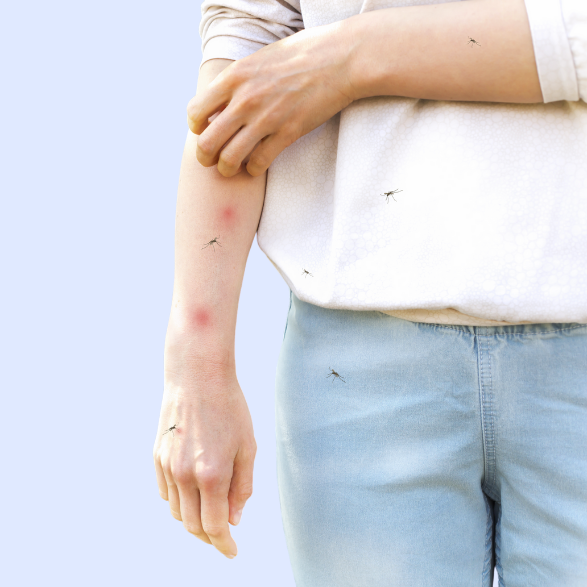
Why Bugs Love You
Published:
3 minute read
With the summer sunshine and social distancing regulations in full swing, you’re probably being pushed outdoors for some much-needed Vitamin D. Hopefully you’re aware of the consequences of sun damage, so now it’s time to focus on the other outdoor skin threat — bug bites. Mosquito season peaks in hot summer months because more are laying eggs and more are hatching. The only thing more annoying than bug bites ruining your clear complexion is when you seem to be the only one they’re biting. So why do bugs love you, and what can you do to make them leave you alone? We have the answers.
Clothing
Mosquitos are looking for a tasty snack, and they do this with sight and smell. As far as sight goes, mosquitoes will more often bite someone dressed in bright, conspicuous clothing compared to people blending in with their environment. Running out of camouflage? Bees especially flock to purple, violet and blue, so avoid these at all costs.

HLA
A mosquito’s ideal smell lies in the complicated makeup of your genetics. Every human has a gene complex known as the human leukocyte antigen (HLA). This complex regulates and informs what type of bacteria you have on the surface of your skin. Mosquitos find some bacterias more appealing than others. If your HLA creates the wrong combination of bacteria, you’ll be more prone to bug bites.
Carbon Dioxide Emission
Research also shows that the more carbon dioxide a person exhales, the more bugs they will attract. The bigger you are, the more carbon dioxide you produce, which explains why adults get bitten more than kids. Pregnant people also exhale more carbon dioxide than others, meaning they will be more at risk for mosquito bites.

Sweat & The Stuff You Use To Cover It Up
If bugs can smell your skin’s bacteria, it’s no surprise they can smell your sweat as well. Again, it depends on the composition of your specific brand of sweat. Many genetic factors inform your sweat smell, but your diet also plays a part. Turns out, bugs are especially enticed by the smell of beer. In addition to the smell of your sweat, bugs also love all of the products you use to cover that smell up. Floral scented body products, such as hairspray, lotion, perfume and deodorant are magnets for mosquitoes.
Your Blood Type
Studies have shown that out of the blood types A, B, AB, and O, type O was preferred by mosquitoes, followed by type A. Unfortunately, your blood type is out of your control, so our O and A friends might need to take some precautionary measures to ward off bugs.
Preventing and Treating Bug Bites
The only ways to prevent bugs from biting you (aside from staying inside) are being diligent with bug repellent and citronella candles. You can also plan to wear earthy tones to blend into your surroundings, and try sitting near a fan to make your cocktail of smells less pungent to bugs.
While most bug bites are harmless and will go away, the constant itching, redness, and inflammation can be irritating and inconvenient. That’s why we recommend applying a hydrocortisone cream to help with itchy, inflamed bug bites. We’re calling hydrocortisone cream the dermatologist dream cream because it’s most dermatologists’ go-to-fix for a number of skin conditions — ranging from eczema and psoriasis to allergic reactions to poison ivy and insect bites.
Medical hydrocortisone works by mimicking the hormone your body naturally creates to reduce inflammation. When faced with irritating stimuli, your body sends white blood cells, triggering itching, burning, redness, irritation, or swelling. Hydrocortisone cream combats this response, alleviating these symptoms. If you’re planning on continuing your outdoor ventures, make sure your hydrocortisone cream doesn’t have added ingredients that could attract more insects.
So wear green, ditch the flowery perfumes, and if all else fails — keep an OTC hydrocortisone product on you at all times!




